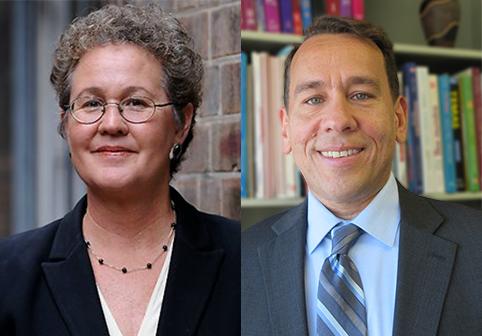
Noted academic Linda Darling-Hammond is keynote speaker at the CCNY School of Education’s centennial observance official kickoff. Edwin Lamboy is SOE Interim Dean.
The year was 1921, and the world was still reeling from the Spanish flu that had claimed 50 million lives, including nearly 700,000 Americans, in the previous three years. At The City College of New York, the nation’s first tuition-free college when it was founded in 1847, two major events occurred in 1921.
In April of that year, the great physicist Albert Einstein stood before an enthusiastic audience at City College and delivered his first-ever lecture in the United States. Later that year, the School of Education (SOE) was established, opening a new chapter in pedagogy at CCNY. The SOE was an expansion of the department of education that had been created in 1906 and initiated the first degree-granting evening program in the country. Before that, CCNY’s philosophy department had offered elective courses in pedagogy since the 1800s.
Flash forward to Thursday, March 25, 2021. Amid another pandemic, CCNY kicks off its School of Education centennial celebration. Linda Darling-Hammond, the noted academic and founding president of the Learning Policy Institute, is the keynote speaker of the official kickoff event. Her virtual talk, 5 – 7 p.m., is entitled “Educating for Democracy in a Diverse World,” which is also the theme of the centennial observance that runs through the fall.
Darling-Hammond will discuss how educators shape the lives of all children around the world. She’s regarded as one of the nation’s most influential people affecting educational policy and served as head of President Barack Obama’s education policy transition team in 2008. Click here to register for the talk.
The SOE has enjoyed numerous milestones since it was established a century ago with Paul Klapper as Dean and a faculty of nine offering 12 courses in areas such as kindergarten and pre-school and leadership and special education.
For instance, the School in the early 1930s reorganized its courses on methods of teaching in the elementary school to reflect the influence of progressive education; it also had historian Max Yergan, an African-American, develop and teach the course “Negro History and Culture,” the first such course offered in any of the city colleges. And later, the SOE offered the pioneering course “The Teacher and the Community: Meeting the Needs of Children of Puerto Rican Descent.”
More recently, the SOE has been recognized for its Early Childhood Education Program which was ranked #4 in the United States among the top 85 most affordable such programs. This is according to the 2020 rankings by Discover Early Childhood EDU, an independent resource for prospective educators seeking long-term employment.
In another 2020 ranking of Best Colleges for Earning Potential, GradReports placed both SOE’s Special Education and Educational Leadership graduate offerings in the top 10 in the United States.
Out of the best 24 colleges that offer a master’s degree in special education -- based on median salary one year after graduation -- CCNY was #6. This is based on SOE alumni earning a median salary of $64,000 once they leave City College.
CCNY’s master’s in educational leadership is a national leader, too, in producing top earners in the field. It’s ranked eighth best among the top 25 schools – again by median salary one year after college. SOE graduates make an average $91,600 straight from City College.
In addition, Intelligent.com ranks CCNY’s Educational Theatre program among the top 50 Master’s in K-12 Education Degree Programs.
About the City College of New York
Since 1847, The City College of New York has provided a high-quality and affordable education to generations of New Yorkers in a wide variety of disciplines. CCNY embraces its position at the forefront of social change. It is ranked #1 by the Harvard-based Opportunity Insights out of 369 selective public colleges in the United States on the overall mobility index. This measure reflects both access and outcomes, representing the likelihood that a student at CCNY can move up two or more income quintiles. In addition, the Center for World University Rankings places CCNY in the top 1.8% of universities worldwide in terms of academic excellence. Labor analytics firm Emsi puts at $1.9 billion CCNY’s annual economic impact on the regional economy (5 boroughs and 5 adjacent counties) and quantifies the “for dollar” return on investment to students, taxpayers and society. At City College, more than 16,000 students pursue undergraduate and graduate degrees in eight schools and divisions, driven by significant funded research, creativity and scholarship. CCNY is as diverse, dynamic and visionary as New York City itself. View CCNY Media Kit.
Jay Mwamba
p: 212.650.7580
e:
jmwamba@ccny.cuny.edu
View CCNY Media Kit.